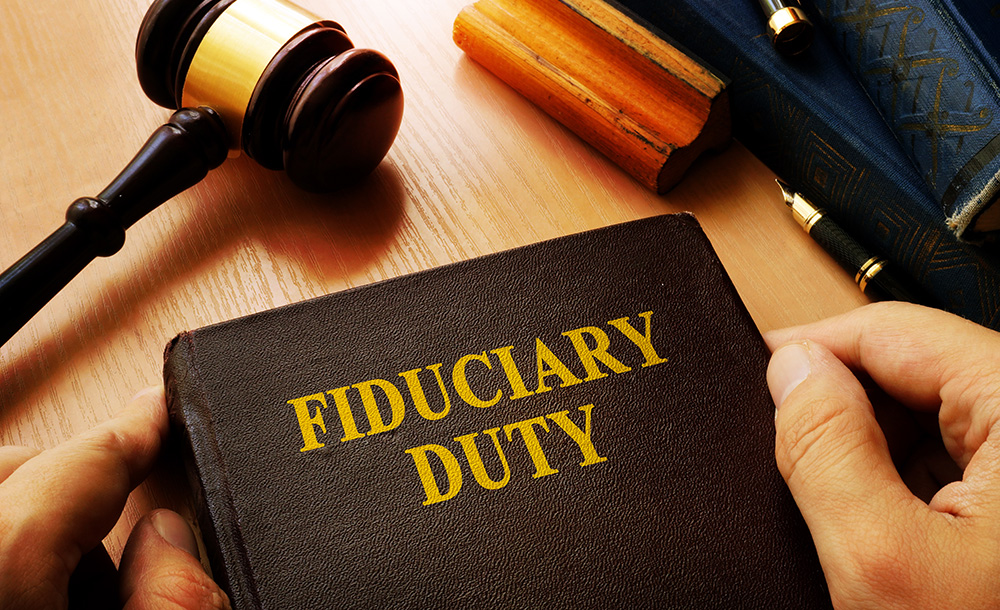Published in the Winter 2025 edition of The Legal Brief.In this classic song by Billie Holiday, she recounts those places where she will be seeing “you.” Not in one place, but many. The same can be said for fiduciary duties. Indeed, they exist in many contexts and in multiple areas of the law.
First, what is a fiduciary duty? It exists when one is under a duty to act or to give advice for the benefit of another person upon matters within the scope of the relationship. A fiduciary relationship exists between two (or more) parties, signifying a relationship of trust whereby the parties are bound to exercise the utmost good faith and undivided loyalty towards each other throughout the relationship.
Fiduciary duties can arise from relationships that are explicitly defined by law or contract or inferred by the circumstances of the relationship. They can be found in a variety of practice areas, such as: estate planning, corporate governance, shareholder relationships, financial planning, attorney-client relationships, LLC’s and partnerships (including law firm partners), principal-agent (e.g. powers of attorney), guardian-ward, employee/employer and even agreements between spouses.
Commercial litigators often wrestle with fiduciary duty issues such as did such a relationship exist, was there a breach, and was there a waiver? In a corporate setting, directors owe a fiduciary duty to the shareholders, to treat all shareholders fairly and evenly, and to the corporation itself.i Shareholders of a close corporation owe each other a duty to act in good faithii; and officers and directors of a corporation “may not assume and engage in the promotion of personal interests which are incompatible with the superior interests of their corporation.”iii However, corporation does not owe fiduciary duties to its members or shareholders.iv
While the foregoing is well-settled law, it is possible to waive certain fiduciary duties through a contract—like in an LLC operating agreement, or a valid general release which would constitute “a complete bar to an action on a claim which is the subject of the release”v provided the language of the release is clear and unambiguous.vi Nevertheless, even with a waiver, a fiduciary cannot entirely avoid disclosing important information, especially in cases of bad faith, intentional misconduct, or personal gain. Similarly, the business judgment rule may bar a claim based on breach of a fiduciary duty if the act is in bad faith or exhibits dishonesty.
But that is only the starting line for breach of fiduciary duty claims. Law partners, no less than any other business or professional partners, are bound by a fiduciary duty requiring “the punctilio of an honor the most sensitive.”vii There is some solace in that a partner does not breach any duty to his old firm by discussing with another partner a joint move to another firm. Partners may solicit others in the firm to make a move, provided notice of the lawyer’s intention to withdraw has been provided first.viii
In the employment law area, an employee is obligated under N.Y. law to be loyal to his employer and is “prohibited from acting in any manner inconsistent with his agency or trust and is at all times bound to exercise the utmost good faith and loyalty in the performance of his duties.”ix This duty is not dependent upon an express contractual relationship but exists even where the employment relationship is at-will. Id.x (“The employer-employee relationship is one of contract, express or implied, and, in considering the obligations of one to the other, the relevant law is that of master-servant and principal-agent.”). Conversely, an employer does not owe employee a fiduciary duty.xi
Even matrimonial matters can involve questions touching on the presence of a fiduciary duty. Agreements between spouses, unlike ordinary business contracts, involve a fiduciary relationship requiring the utmost of good faith. There is a strict surveillance of all transactions between married persons, especially separation agreements.xii Indeed, even without marriage, a fiduciary relationship could exist as “romantic companions of 14 years were in confidential relationship of trust and confidence”xiii and “defendant had a fiduciary relationship with plaintiff both as her fiancé and as her spouse.”xiv
In sum, as a breach of fiduciary duty is a tort giving rise to the possibility of enhanced damages, it must be seriously considered by the plaintiff and kept in mind by a potential defendant in a whole host of transactions.
Paul F. Millus, Esq is a Shareholder at Meyer, Suozzi, English & Klein, P.C. in the Business Litigation and Employment Departments.
__________
i Schwartz v. Marien, 37 N.Y.2d 487, 491, 373 N.Y.S.2d 122 (1975).
ii Matter of Cassata v. Brewster–Allen–Wichert, Inc., 248 A.D.2d 710, 711, 670 N.Y.S.2d 552 (2d Dep’t 1998).
iii Foley v. D’Agostino, 21 A.D.2d 60, 66, 248 N.Y.S.2d 121 (1st Dep’t 1964).
iv Peacock v. Harold Square Loft Corp., 67 A.D.3d 442, 443, 889 N.Y.S.2d 22 (1st Dep’t 2009).
v Global Mins. & Metals Corp. v. Holme, 35 A.D.3d 93, 98, 824 N.Y.S.2d 210 [1st Dept 2006].
vi Booth v 3669 Delaware, 92 N.Y.2d 934, 680 N.Y.S.2d 899 (1998).
vii Graubard Mollen Dannet & Horowitz v. Moskovitz, 86 N.Y.2d 112, 118, 629 N.Y.S.2d 1009 (1995).
viii Gibbs v. Breed, Abbott & Morgan, 271 A.D.2d 180, 710 N.Y.S.2d 578 (1st Dep’t 2000).
ix W. Elec. Co. v. Brenner, 41 N.Y.2d 291, 295, 392 N.Y.S.2d 409 (1977).
x W. Elec. Co. v. Brennet, 41 N.Y.2d at 295 (1977).
xi Rather v. CBS Corp., 68 A.D.3d 49, 55, 710 N.Y.S.2d 578 (1st Dep’t 2009).
xii Christian v. Christian, 42 N.Y.2d 63, 72, 396 N.Y.S.2d 817 (1977).
xiii Robinson v. Day, 103 A.D.3d 584, 585, 960 N.Y.S.2d 397 (1st Dep’t 2013).
xiv Colello v. Colello, 9 A.D.3d 855, 858–859, 780 N.Y.S.2d 450 (4th Dep’t 2004).
